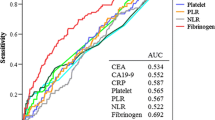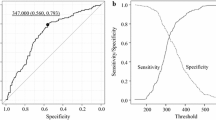Abstract
Background
The outcomes of colorectal cancer are determined by host factors, including systemic inflammation. The purpose of this study was to evaluate the prognostic significance of fibrinogen and inflammation-based scores, as markers of the inflammatory response, in colon cancer.
Methods
We retrospectively reviewed the medical records of patients with nonmetastatic colon cancer who underwent curative resection between January 2005 and December 2007. Fibrinogen, albumin, C-reactive protein, neutrophil, lymphocyte, and platelet counts were measured at the time of diagnosis. Correlations between preoperative plasma fibrinogen levels and clinicopathologic characteristics were analyzed. Univariate and multivariate survival analyses were performed to identify factors associated with disease-free and overall survival.
Results
A total of 624 patients who underwent curative resection for colon cancer were eligible for this study. Mean preoperative plasma fibrinogen levels were 325.24 ± 88.19 mg/dl. Higher preoperative plasma fibrinogen levels were associated with sex (male), old age, poorly/mucinous differentiated tumor, advanced tumor stage, elevated carcinoembryonic antigen (CEA) levels, higher modified Glasgow Prognostic Score, and higher neutrophil:lymphocyte and platelet:lymphocyte ratios. In multivariate analysis, elevated plasma fibrinogen level [disease-free survival: hazard ratio (HR) 1.999, 95 % confidence interval (95 % CI) 1.081–3.695, P = .027; overall survival: HR 3.138, 95 % CI 1.077–9.139, P = .036], advanced tumor stage, and higher CEA levels were independently associated with worse disease-free survival and overall survival. None of the inflammation-based scores were significantly associated with survival.
Conclusions
Fibrinogen as one of inflammatory markers may be considered a possible prognostic marker in colon cancer.

Similar content being viewed by others
References
Siegel R, Naishadham D, Jemal A. Cancer statistics, 2012. CA Cancer J Clin. 2012;62:10–29.
Jung KW, Park S, Kong HJ, Won YJ, Lee JY, Seo HG, et al. Cancer statistics in Korea: incidence, mortality, survival and prevalence in 2009. Cancer Res Treat. 2012;4:11–24.
Yamashita H, Kitayama J, Taguri M, Nagawa H. Effect of preoperative hyperfibrinogenemia on recurrence of colorectal cancer without a systemic inflammatory response. World J Surg. 2009;33:1298–305.
Tang L, Liu K, Wang J, Wang C, Zhao P, Liu J. High preoperative plasma fibrinogen levels are associated with distant metastases and impaired prognosis after curative resection in patients with colorectal cancer. J Surg Oncol. 2010;102:428–32.
Kawai K, Kitayama J, Tsuno NH, Sunami E, Nagawa H. Hyperfibrinogenemia after preoperative chemoradiotherapy predicts poor response and poor prognosis in rectal cancer. Int J Colorectal Dis. 2011;26:45–51.
Roxburgh CS, Crozier JE, Maxwell F, Foulis AK, Brown J, McKee RF, et al. Comparison of tumour-based (Petersen Index) and inflammation–based (Glasgow Prognostic Score) scoring systems in patients undergoing curative resection for colon cancer. Br J Cancer. 2009;100:701–6.
McMillan DC, Crozier JE, Canna K, Angerson WJ, McArdle CS. Elevation of an inflammation-based prognostic score (GPS) in patients undergoing resection for colon and rectal cancer. Int J Colorectal Dis. 2007;22:881–6.
Ishisuka M, Nagata H, Takagi K, Horie T, Kubota K. Inflammation-based prognostic score is a novel predictor of postoperative outcome in patients with colorectal cancer. Ann Surg. 2007;246:1047–51.
Ishizuka M, Nagata H, Takagi K, Kubota K. Influence of Inflammation-based prognostic score on mortality of patients undergoing chemotherapy for far advanced or recurrent unresectable colorectal cancer. Ann Surg. 2009;250:268–72.
Leitch EF, Chakrabarti M, Crozier JE, McKee RF, Anderson JH, Horgan PG, et al. Comparison of the prognostic value of selected markers of the systemic inflammatory response in patients with colorectal cancer. Br J Cancer. 2007;97:1266–70.
Roxburgh CS, McMillan DC. Role of systemic inflammatory response in predicting survival in patients with primary operable cancer. Future Oncol. 2010;6:149–63.
Walsh SR, Cook EJ, Goulder F, Justin TA, Keeling NJ. Neutrophil-lymphocyte ratio as a prognostic factor in colorectal cancer. J Surg Oncol. 2005;91:181–4.
Proctor MJ, Morrison DS, Talwar D, Balmer SM, Fletcher CD, O’Reilly DS, et al. A comparison of inflammation-based prognostic scores in patients with cancer. A Glasgow inflammation outcome study. Eur J Cancer. 2011;47:2633–41.
Halazun KJ, Aldoori A, Malik HZ, Al-Mukhtar A, Prasad KR, Toogood GJ, et al. Elevated preoperative neutrophil to lymphocyte ratio predicts survival following hepatic resection for colorectal liver metastases. Eur J Surg Oncol. 2008;34:55–60.
Ding PR, An X, Zhang RX, Fang YJ, Li LR, Chen G, et al. Elevated preoperative neutrophil to lymphocyte ratio predicts risk of recurrence following curative resection for stage IIA colon cancer. Int J Colorectal Dis. 2010;25:1427–33.
Kwon HC, Kim SH, Oh SY, Lee S, Lee JH, Choi HJ, et al. Clinical significance of preoperative neutrophil-lymphocyte versus platelet-lymphocyte ratio in patients with operable colorectal cancer. Biomarkers. 2012;17:216–22.
Kamath S, Lip GY. Fibrinogen: biochemistry, epidemiology and determinants. QJM. 2003;96:711–29.
Davalos D, Akassoglou K. Fibrinogen as a key regulator of inflammation in disease. Semin Immunopathol. 2012;34:43–62.
Jones JM, McGonigle NC, McAnesoie M, Cran GW, Graham AN. Plasma fibrinogen and serum C-reactive protein are associated with non-small cell lung cancer. Lung Cancer. 2006;53:97–101.
Guo Q, Zhang B, Dong X, Xie Q, Guo E, Huang H, et al. Elevated levels of plasma fibrinogen in patients with pancreatic cancer: possible role of a distant metastasis predictor. Pancreas. 2009;38:75–9.
Ghezzi F, Cromi A, Siesto G, Giudici S, Serati M, Formenti G, et al. Prognostic significance of preoperative plasma fibrinogen in endometrial cancer. Gynecol Oncol. 2010;119:309–13.
Polterauer S, Grimm C, Seebacher V, Concin N, Marth C, Tomovski C, et al. Plasma fibrinogen levels and prognosis in patients with ovarian cancer: a multicenter study. Oncologist. 2009;14:979–85.
Yamashita H, Kitayama J, Kanno N, Yatomi Y, Nagawa H. Hyperfibrinogenemia is associated with lymphatic as well as hematogenous metastasis and worse clinical outcome in T2 gastric cancer. BMC Cancer. 2006;6:147.
Acknowledgment
This study was supported by a grant from the National Cancer Center Grant (NCC-0910160) and by the Converging Research Center Program funded by the Ministry of Education, Science and Technology (Project No. 1131150).
Disclosure
All of authors declared no conflicts of interest or financial ties to disclose.
Author information
Authors and Affiliations
Corresponding author
Electronic supplementary material
Below is the link to the electronic supplementary material.
10434_2013_2968_MOESM2_ESM.tif
Disease free survival according to use of chemotherapy in stage II patients with higher preoperative plasma fibrinogen (TIFF 1924 kb)
10434_2013_2968_MOESM3_ESM.tif
Overall survival according to use of chemotherapy in stage II patients with higher preoperative plasma fibrinogen (TIFF 1924 kb)
Rights and permissions
About this article
Cite this article
Son, HJ., Park, J.W., Chang, H.J. et al. Preoperative Plasma Hyperfibrinogenemia is Predictive of Poor Prognosis in Patients with Nonmetastatic Colon Cancer. Ann Surg Oncol 20, 2908–2913 (2013). https://doi.org/10.1245/s10434-013-2968-8
Received:
Published:
Issue Date:
DOI: https://doi.org/10.1245/s10434-013-2968-8




